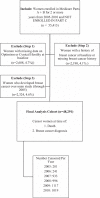Optimism may moderate screening mammogram frequency in Medicare: A longitudinal study
- PMID: 31192918
- PMCID: PMC6587654
- DOI: 10.1097/MD.0000000000015869
Optimism may moderate screening mammogram frequency in Medicare: A longitudinal study
Erratum in
-
Optimism may moderate screening mammogram frequency in Medicare: A longitudinal study: Erratum.Medicine (Baltimore). 2019 Jul;98(27):e16380. doi: 10.1097/MD.0000000000016380. Medicine (Baltimore). 2019. PMID: 31277193 Free PMC article. No abstract available.
Abstract
Higher trait optimism and/or lower cynical hostility are associated with healthier behaviors and lower risk of morbidity and mortality, yet their association with health care utilization has been understudied. Whether these psychological attitudes are associated with breast cancer screening behavior is unknown. To assess the association of optimism and cynical hostility with screening mammography in older women and whether sociodemographic factors acted as mediators of these relationships, we used Women's Health Initiative (WHI) observational cohort survey data linked to Medicare claims. The sample includes WHI participants without history of breast cancer who were enrolled in Medicare Parts A and B for ≥2 years from 2005-2010, and who completed WHI baseline attitudinal questionnaires (n = 48,291). We used survival modeling to examine whether screening frequency varied by psychological attitudes (measured at study baseline) after adjusting for sociodemographic characteristics, health conditions, and healthcare-related variables. Psychological attitudes included trait optimism (Life Orientation Test-Revised) and cynical hostility (Cook Medley subscale), which were self-reported at study baseline. Sociodemographic, health conditions, and healthcare variables were self-reported at baseline and updated through 2005 as available. Contrary to our hypotheses, repeated events survival models showed that women with the lowest optimism scores (i.e., more pessimistic tendencies) received 5% more frequent screenings after complete covariate adjustment (p < .01) compared to the most optimistic group, and showed no association between cynical hostility and frequency of screening mammograms. Sociodemographic factors did not appear to mediate the relationship between optimism and screenings. However, higher levels of education and higher levels of income were associated with more frequent screenings (both p < .01). We also found that results for optimism were primarily driven by women who were aged 75 or older after January 2009, when changes to clinical guidelines lead to uncertainty about risks and benefits of screening in this age group. The study demonstrated that lower optimism, higher education, and higher income were all associated with more frequent screening mammograms in this sample after repeated events survival modeling and covariate adjustment.
Conflict of interest statement
The authors have no conflicts of interest to report.
Figures



References
-
- Bleyer A, Welch HG. Effect of three decades of screening mammography on breast-cancer incidence. N Engl J Med 2012;367:1998–2005. - PubMed
-
- Myers ER, Moorman P, Gierisch JM, et al. Benefits and harms of breast cancer screening: a systematic review. JAMA 2015;314:1615–34. - PubMed
-
- Schonberg MA, McCarthy EP, Davis RB, et al. Breast cancer screening in women aged 80 and older: results from a national survey. Am Geriatr Soc 2004;52:1688–95. - PubMed
-
- Siu AL, Bibbins-Domingo K, Grossman DC, et al. Convergence and divergence around breast cancer screening. Ann Intern Med 2016;164:301–2. - PubMed
-
- Jiang M, Hughes DR, Duszak R., Jr Screening mammography rates in the Medicare population before and after the 2009 U.S. preventive services task force guideline change: an interrupted time series analysis. Women's Health Issues 2015;25:239–45. - PubMed

